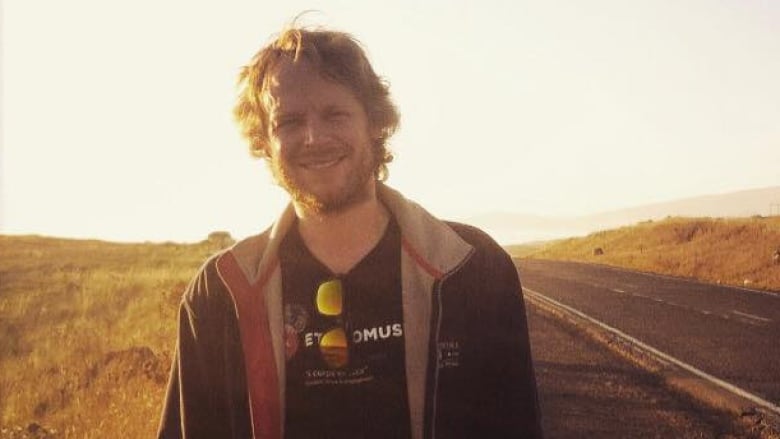Composer killed in N.W.T. bear attack remembered for unique blend of music and nature
Julien Gauthier was in the Canadian North to record the sounds of nature and wildlife

Julien Gauthier was one of the rare musicians who took it upon himself to bridge the gap between art and science, says his colleague Marc Feldman.
The Ottawa-born French composer was attacked and killed by a bear killed near Tulita, N.W.T, on Aug. 15, the French newspaper Le Parisien reports.
He was in the region to collect audio recordings of nature and wildlife to use in his compositions. His travel companion, researcher and photographer Camille Toscani, survived.
RCMP and the territory's coroner told CBC News that a man who was reported missing after a "bear encounter" near Tulita was found dead, but would not confirm his identify.
Before he died, Gauthier was working on a new symphony for France's Brittany Symphony Orchestra. Feldman, the orchestra's director, spoke with As It Happens guest host Helen Mann about Gauthier and his music. Here is part of their conversation.
When you look at Mr. Gauthier's Facebook page, it's pretty clear how excited he was about this trip to Canada. What was his plan for this visit to the Northwest Territories?
First of all, he is Canadian. He was born in Ottawa. And he was so happy to do this trip. That's something he's wanted to do, you know, [for] such a long time.
His idea was, first of all, to make the trip — the trek, I guess you could call it — and record sounds and to get inspiration for a new work for cello and photography in the concert that he was going to do when he returned, and then perhaps other things with the Symphony Orchestra as well.

Was it for inspiration or was something he would incorporate into the actual work?
He did both. He would incorporate sound into the actual work at times when he really wanted to use it. And at other times, he'd be inspired by it, inspired by the atmosphere, the rhythms and the things that he would record.
Why the Northwest Territories?
He was very attracted by faraway spaces and faraway places and isolation. It's funny. He's a very sociable guy, but when he wanted to write, he needed to get away.
And, of course, you mentioned he was born in Canada. Did he maintain his connections to this country?
Absolutely. He's a Canadian citizen. And I know that he was proud to be a dual Canadian and French citizen.
How familiar was Mr. Gauthier with the remote outdoors?
I know that he's been to a number of remote areas in the world, always accompanied by scientists. I know that's something that he enjoyed. ... He was very excited to do it, and I know that he prepared very, very well.
How did you first meet Julien Gauthier?
I'm the director of a symphony orchestra, a pretty classical symphony orchestra, and we do some strange things on occasion. We reach out beyond the classical world.
And I got a call from Julien one day and said he had a crazy idea that he wanted to accompany some scientists to these faraway islands near the Antarctic and he wanted to live with them for a few months and get inspiration to write a symphony.
And when I heard that .... I immediately said yes. I said, "If you can find the funding, we will do the world premiere."
And he found the funding, and we ended up doing it. And then after that, it's just been a three-year residency with the orchestra that's been wonderful.
So you had no hesitation? It didn't sound like a crazy idea?
It was so crazy you couldn't say no, if you know what I mean.
Was he unique, then, among some of the composers you would have worked with?
Julien really wanted to connect with something else. He really wanted to connect with nature, but not only with nature, but with the scientists and the people that actually are studying the world today.
And I thought that bridge between science and art was something very, very important today, and that's something that we were working on.
I might have said that it was a crazy and funny idea, but there was much more depth to it than that. And I think it's very important to do the kind of work he did in today's classical music world.
- AS IT HAPPENS: Why it took 33 years for Igloolik rock stars to make a new album
- AS IT HAPPENS: Meet the biologist who says trees have their own songs
Why is that?
A lot of people say that, you know, classical music and sometimes contemporary classical music, is out of reach, elitist, distant for most of the public today.
I think we need to create the bridges and the connections to other arts and other fields and reach out beyond what we can do.
Written by Sheena Goodyear with files from CBC North. Interview produced by Katie Geleff. Q&A has been edited for length and clarity.